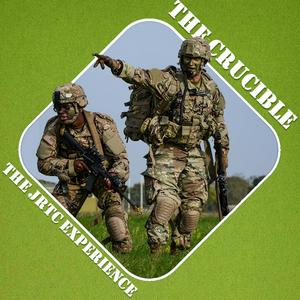112 S05 Ep 07 – Triage Under Fire: What Leaders Must Know About Prolonged Casualty Care, Pt 2/2
The Joint Readiness Training Center is pleased to present the one-hundredth-and-twelfth episode to air on ‘The Crucible - The JRTC Experience.’ Hosted by the Senior Medical Operations Officer Observer-Coach-Trainer for the Task Force Sustainment (BSB / CSSB), CPT Victor Velez on behalf of the Commander of Ops Group (COG). Today’s guests are subject matter experts in each of their warfighting fields, MAJ Jon Austin, SFC Scott Gallagher, 1LT Andy Cornelison, and LTC Max Ferguson. MAJ Austin is an armor officer from the Close Combat Lethality Task Force at the Maneuver Center of Excellence. SFC Gallagher is the former senior medic for 2-14 IN BN and is currently the Senior Enlisted Medical Advisor OCT for TF Sustainment (BSB / CSSB). 1LT Cornelson is a former Army Special Forces medic and is now the Physician’s Assistant for 2-14 Infantry BN, “Golden Dragons” of 2nd IBCT, 10th Mountain Division. LTC Max Ferguson is the former BN Commander for 2-14 IN BN and is now the G-3 Operations Officer for 10th Mountain DIV as well as serving as the J-3 for the JTF Southern Border.
The 2nd Infantry Brigade Combat Team, 10th Mountain Division, known by its Hollywood call-sign “Commando Brigade”, is a light infantry unit headquartered at Fort Drum, New York. Carrying the proud motto “Courage and Honor,” the brigade traces its lineage to the 10th Mountain Division’s storied World War II legacy in the mountains of Italy, where it earned distinction for its rugged combat effectiveness in extreme terrain. Reactivated in the post-Vietnam era, 2nd IBCT has since deployed multiple times in support of operations in Iraq and Afghanistan, exemplifying rapid deployment capability, adaptability, and lethality. Today, the Commando Brigade remains a cornerstone of the Army’s light infantry force, specializing in mountain and cold-weather operations while preparing for large scale combat operations across multiple domains.
The “golden hour” concept from the Global War on Terror era is being expanded in LSCO to account for prolonged casualty care under contested evacuation timelines. Whole blood and walking blood banks extend treatment coverage, creating larger windows for evacuation to the next level of care. While long practiced within Army Special Operations Forces (ARSOF), this marks the first employment of the concept by a conventional unit in recent history.
In this episode of The Crucible podcast, the panel continues its in-depth discussion on prolonged casualty care (PCC) in large-scale combat operations (LSCO), building on themes introduced in part one. A key focus is on how modern units—especially those operating in austere, isolated, or logistically constrained environments—must adapt to provide lifesaving care when evacuation within the “Golden Hour” is not possible. From operations in Syria and the U.S. southern border to anticipated LSCO scenarios, the conversation highlights the reality that prolonged field care (PFC) is not a future problem—it’s a current operational requirement. We unpack the complexity of holding casualties for hours (or days), examining scenarios where role 1 and 2 facilities become primary treatment centers in the absence of immediate access to surgical capabilities.
The conversation also addresses the practical responsibilities of leaders—both medical and maneuver—in creating the conditions for success. Topics include the importance of tourniquet conversion training, integrating whole-blood programs, designing low-signature CASEVAC platforms, and standardizing tactical combat casualty care (TC3) across formations. Leaders emphasize the need to build experiential knowledge in junior medics through trauma center exposure, paramedic fellowships, and realistic simulation labs. The gap in trauma experience across the force—especially among junior NCOs and medics—is framed as a critical training challenge, compounded by outdated equipment and inconsistent SOPs. The episode concludes with a call to prioritize medics’ professional development, create scalable medical rehearsals nested within maneuver plans, and cultivate confidence in combat casualty care as a decisive enabler in LSCO.
Part of S05 “Beans, Bullets, Band-Aids, Batteries, Water, & Fuel” series.
For additional information and insights from this episode, please check-out our Instagram page @the_jrtc_crucible_podcast
Be sure to follow us on social media to keep up with the latest warfighting TTPs learned through the crucible that is the Joint Readiness Training Center.
Follow us by going to: https://linktr.ee/jrtc and then selecting your preferred podcast format.
Again, we’d like to thank our guests for participating. Don’t forget to like, subscribe, and review us wherever you listen or watch your podcasts — and be sure to stay tuned for more in the near future.
“The Crucible – The JRTC Experience” is a product of the Joint Readiness Training Center.


